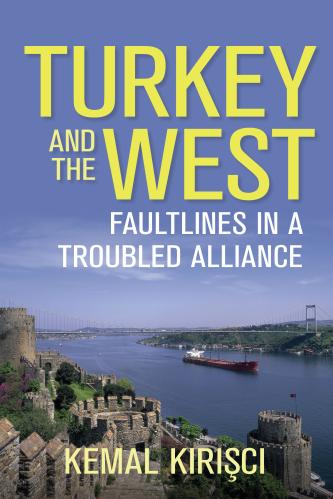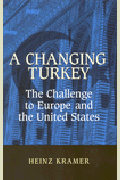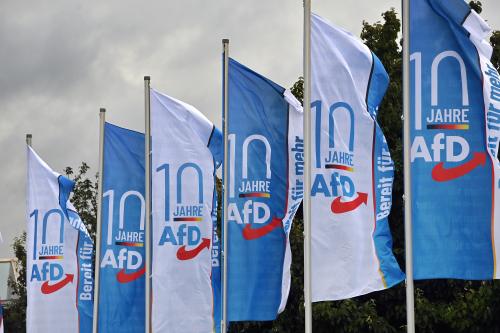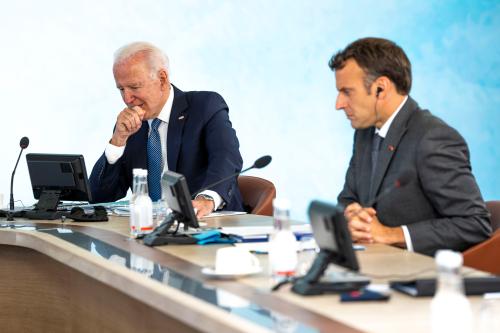Criticism of Turkish President Recep Tayyip Erdoğan’s increasingly authoritarian policies has been growing in Europe, and a thumbs down from Germany on EU accession talks might tip the scale. Yet, putting an end to Turkey’s European vocation for short-term electoral gains is wrong and strategically self-defeating, argues Kemal Kirişci. This piece was originally published by the German Marshall Fund.
In a televised debate last week ahead of the national elections in Germany, Chancellor Angela Merkel and Martin Schulz—leaders of the Christian Democratic Union (CDU) and Social Democratic Party of Germany (SPD), respectively—stated that Turkey could not and should not be allowed to become a member of the European Union. Understandably, they are frustrated with the actions and rhetoric of the Turkish President Recep Tayyip Erdoğan. His recent practice of calling German politicians “Nazis,” coupled with his blatant interference in Germany’s domestic affairs by labelling CDU and SPD “enemies of Turkey” and calling on the Turkish diaspora not to vote for them has generated substantial resentment.
Relations became even more tense when Erdoğan suggested that he would be prepared to release the growing number of German nationals detained in Turkey in exchange for individuals who were allegedly implicated in last year’s coup attempt and fled to Germany. Such blatant disregard for the rule of law—not to mention the complete lack of ethics—placed Erdoğan beyond the pale for both German leaders and public opinion, almost forcing the leadership to take a firmer stand against Turkey. Merkel and Schulz are also conscious of the need to stand up to the right-wing extremist Alternative for Germany (AfD), which has long propagated an anti-Turkish discourse.
It would take a consensus of all 27 EU member states to end the accession negotiations with Turkey. But criticism of Erdoğan’s increasingly authoritarian policies has been growing in Europe, and a thumbs down from Germany might tip the scale. Yet, putting an end to Turkey’s European vocation for short-term electoral gains is wrong and strategically self-defeating. Most importantly, the issue of Turkish–European relations transcends Erdoğan. Persecution of the media and the suppression of free expression by the Turkish authorities make it difficult to gauge the real mood of the country from outside. The April 2017 constitutional referendum, which expanded Erdoğan’s presidential powers, and the state of emergency that has been in effect since the coup attempt of July 2016, certainly point to an autocratic future for Turkey. However, modern, democratic Turkey has by no means disappeared and there is also the “other” Turkey to Erdoğan’s one that is becoming increasingly visible against all odds.
As Merkel herself underlined at the debate, very close to 50 percent of the Turkish population disagree with their ruler and are not against closer ties with the EU. The constitutional amendments were adopted by a very narrow margin, and they failed in Turkey’s major cities, including Istanbul, Ankara, Izmir, and Antalya, despite the fact that they are run by mayors from Erdoğan’s Justice and Development Party (AKP). It is also not clear that all leading AKP figures and voters actually supported the referendum. The “march for justice” led by Kemal Kılıçdaroğlu, leader of the main opposition Republican People’s Party (CHP), this past summer drew huge crowds. A seasoned female politician and former member of the Nationalist Action Party (MHP), Meral Akşener, is advancing her efforts to form a political party that threatens to capture the “center-right” votes from Erdoğan ’s AKP. Furthermore, under the amended constitution, Erdoğan will need a “50 percent + 1” of the votes to win the next elections in November 2019. The president’s aggressive posture is an acknowledgement that he is concerned about his prospects, and aware of the existence of opposition. Merkel and Schulz should not undermine the aspirations of the Turkey that yearns for a return to greater rule of law and the democratic rule it once tasted when the EU was fully engaging Turkey.
Martin Schulz, in particular, is betraying the legacy of his SPD, as well as that of social democrats across the EU, who had argued that Turkey’s accession bid would be a test-case for a plural and diverse Europe (on the condition that Turkey was prepared to comply with the democratic standards of the EU, the so-called Copenhagen criteria). It was the former SPD Chancellor Gerhard Schröder and Greens Foreign Minister and Vice Chancellor Joschka Fischer who had advocated for Turkey’s membership in 1998. This was in stark contrast to the European Christian Democrats, who had only a year earlier firmly defined European integration as a project that could not include a culturally (read: religiously) different Turkey. This courageous stance of Europe’s and Germany’s social democrats helped Turkey ramp up its reform efforts, despite another period of poor German–Turkish and European–Turkish relations over persistent human and civil rights issues in the early 1990s; Turkey gained candidate status in 1999; and began membership talks in 2005. In retrospect, these were the golden years in EU–Turkish relations.
Angela Merkel and her Christian Democrats in contrast never wanted Turkey to become an EU member. Instead and with support from France’s then President Nicolas Sarkozy, she advocated a “privileged partnership.” Accordingly, the negotiation framework adopted for Turkey in October 2005, in contrast to previous practice, stated that the negotiations would be “open ended,” undermining the credibility of the accession process right from the start. Many in Turkey interpreted this as discriminatory, and the obvious unwillingness to bring Turkey into the European fold chipped away at the Turkish public’s enthusiasm for EU membership and the accompanying reform process. It also drastically weakened the hand of the pro-EU and pro-reform coalition in Turkey. This is not to shift the entire responsibility for the current situation on to Merkel or Christian Democrats. It does, though, beg the question of where EU-Turkish relations would be today had Merkel and the EU displayed more enthusiasm toward Turkey’s accession from the start.
It is difficult to see how stopping Turkey’s EU vocation because of Erdoğan’s unpopularity will benefit either the EU or the wider transatlantic community.
Finally, ending Turkey’s accession process would be strategic nonsense at a time of global uncertainty and volatility. Turkey has been part of the transatlantic community since the end of World War II and is deeply integrated into this community economically, institutionally, militarily, and politically. As I explore in my forthcoming book “Turkey and the West: Faultlines in a Troubled Alliance,” accession to the EU was meant to anchor Turkey into this community unequivocally and make Turkey a solid defender of the liberal international order. These developments transformed Turkey into an asset for the transatlantic community and a model for other countries aspiring to join this order—a beacon of hope for countries that had been excluded for various reasons connected to culture, geography, history, or politics. It helped safeguard the West against its enemies—those powers keen to introduce an alternative order based on state capitalism, sovereign democracy, and authoritarian rule. It is difficult to see how stopping Turkey’s EU vocation because of Erdoğan’s unpopularity will benefit either the EU or the wider transatlantic community.
Accession negotiations are replete with challenges. Turkish democracy, not to mention its economy and foreign policy, has receded considerably from the heights it had once reached—now ironically—under Erdoğan’s rule. It is important to remember that the EU had originally engaged Turkey precisely for this reason: to encourage Turkey to push through democratic reforms and move on from where it was in the 1990s, mired in political and economic problems and foul relations with its neighbors. As things stand, it is doubtful that Turkey under Erdoğan can achieve this once more. Yet, it is also doubtful whether rupturing relations with Turkey would help improve the bilateral relations. Both sides face a multitude of shared challenges, ranging from combating terrorism to dealing with migration and an ever more assertive Russia, they have no choice but to find a way to work together. It must have been the sober recognition of this reality that led the current High Representative of the European Union for Foreign Affairs and Security Policy and Vice-President of the European Commission Federica Mogherini to highlight the importance of maintaining Turkey’s EU vocation. She is right, and the EU’s transatlantic partners including the United States have a stake in supporting her.






Commentary
On Turkey, Germany’s Merkel and Schulz are making a major strategic mistake
September 13, 2017